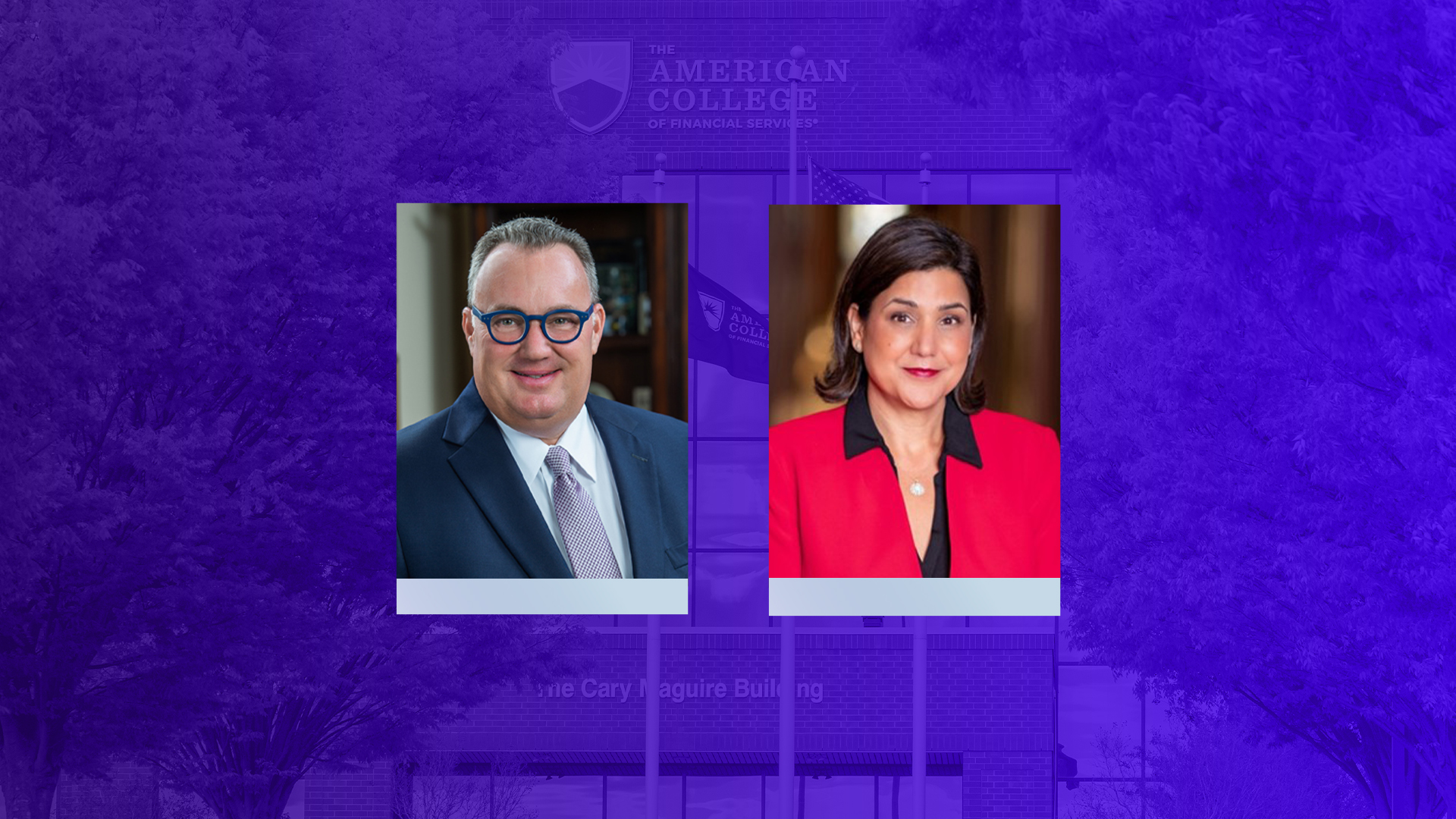About The College Press
Industry Executives Join College Board of Trustees

KING OF PRUSSIA, Pa. — August 6, 2025 - Virendra and Stamp will provide governance oversight of and work closely with The College’s executive leadership team as it continues to expand its footprint and impact in financial services and the communities it serves.
Virendra is senior vice president and head of agency at New York Life, where she oversees the company’s career agency distribution system. In this role, she leads a network of over 12,000 agents and advisors throughout more than 110 general offices nationwide and manages the business units that deliver strategic support to the field. Virendra was selected to join New York Life’s executive management committee in January 2025. She has received The College’s Chartered Life Underwriter® (CLU®), Chartered Financial Consultant® (ChFC®), and Chartered Leadership Fellow® (CLF®) designations as well as the Life Underwriter Training Council Fellow® (LUTCF®).
Stamp is chief executive officer of Cary Stamp & Co., which he established more than 20 years ago to meet the growing need for expert financial advice and advocacy. He advises high-net-worth individuals, business owners, executives, and affluent multigenerational families, providing them with independent analysis and planning for all aspects of their financial lives. Stamp holds The College’s Retirement Income Certified Professional® (RICP®) and Chartered Advisor in Philanthropy® (CAP®) designations as well as the CFP®, AIF®, AEP®, and CDFATM.
“As College alumni, deep believers in the power of lifelong learning, and executive leaders within financial services, Sonali and Cary have long embodied our mission: to educate financial services professionals, empower and champion their growth, and support their competence and confidence to uplift millions of families across America,” said George Nichols III, CAP®, president and CEO of The American College of Financial Services. “As members of our board of trustees, their experience and perspectives will be invaluable to helping us expand our impact nationwide.”
For more information about The College’s board of trustees and its executive leadership team, please visit this page.
For more information, contact:
Sarah Tremallo
908-967-0381
Stremallo@jconnelly.com
Jared Trexler
610-526-1268
jared.trexler@theamericancollege.edu
About The American College of Financial Services
The American College of Financial Services is the nation’s largest provider of financial planning education through its CFP® Certification Education Program* and ChFC® designation program. The College goes beyond foundational education with rigorous programs, ethical standards, and experience requirements for professionals who wish to specialize in areas such as retirement income planning, tax planning, philanthropic planning, and more.
Connect with The College on LinkedIn, Instagram, Facebook, and YouTube. Discover all the ways you can expand your opportunities.
*Certified Financial Planner Board of Standards Inc. owns the certification marks CFP®, CERTIFIED FINANCIAL PLANNER™, CFP® (with plaque design), and CFP® (with flame design) in the U.S., which it awards to individuals who successfully complete CFP Board's initial and ongoing certification requirements.
Practice Management Insights
Cyber Awareness for Advisors

In a recent conversation, Ken Smith, Offensive Security Certified Professional (OSCP), Offensive Security Wireless Professional (OSWP) spoke on the importance of cybersecurity in the financial services industry and provided useful insights that financial professionals can leverage to ensure they’re taking all the necessary steps to safeguard their clients’ sensitive data.
Throughout his career, Smith has lived in the intersection of cybersecurity and financial services, notably serving as the vice president on the red team at Bank of America. In this role, Smith simulated the role of a malicious threat actor, working to compromise the organization’s security controls and gain access to sensitive data. Smith has served in similar roles throughout his career, frequently working on behalf of clients in the financial sector.
Security Insights for Advisors
When discussing the threats that face advisors and their practices, Smith said, “My biggest concern is assuming you’re not a target…the truth is those types of businesses (RIA firms) are handling the same type of information as all these big businesses are, but they’re working with fewer people in security, a smaller knowledge base, and usually significantly less budget. And so if anything, they’re bigger targets.”
Small firms and big firms alike handle personal identifiable information (PII). This information is the exact type of data attackers will target when trying to compromise an organization. Anything that can be used to steal someone’s identity is desirable to a threat actor.
However, customer data, data and acquisitions, and compliance data are all desirable to hackers as well. These can all lead to stolen data, fines, and more if a compromise occurs.
Smith emphasized that the best step financial professionals can take in the scenario that they are responsible for their firm’s cybersecurity is promoting awareness and preventing the firm from becoming a target of opportunity. He believes this starts with education, stating, “In terms of general education, community groups and user groups are really good. Groups like InfraGard can help you get tapped into groups like the FBI, and there’s a lot of knowledge sharing that goes around.”
Smith also suggested that advisory firms working with third-party service providers or network service providers regularly meet with these third-parties to discuss what sort of risks they face and take part in developing the necessary security controls: “You want to have skin in the game to have ownership over those security outcomes.”
Understanding Social Engineering
On the less technical side of cybersecurity, financial professionals will also have to learn how to deal with social engineering. One of the most common forms of social engineering is “phishing,” a technique likely known by most. However, social engineering can refer to a variety of methods used by a threat actor to trick their way into obtaining sensitive information.
Smith began this conversation by distinguishing the difference between a phishing email and a spam email. According to Smith, a large amount of the education on social engineering suggests that inconsistencies or obvious mistakes such as a suspicious domain name indicate a phishing email. However, Smith says these emails really fall more under the category of spam. Phishing emails have grown in sophistication and tend to look more real. These are also highly prevalent, as the tools to make a phishing email require a fairly low effort and little to no cost.
In this scenario, Smith highlighted the importance of having a well-established and rehearsed policy on how to handle a compromise, “It’s not just the technology, it’s not just educating people. You have to have a process in place to respond when something goes wrong.”
Security for Independents
When working at a smaller firm, the security considerations of an advisor are often different than those of an individual at a large corporate firm. With employees often having to perform multiple roles and handle a greater variety of responsibilities, managing risk can be a challenge.
In this scenario, Smith encourages advisors to leverage third-parties to assist in a managed detection response solution, as well as the importance of cyber insurance, “You can’t do that after the fact. Once you get breached, you’re not saying, ‘Oh by the way, I need insurance.’”
In order to avoid compromises, Smith promotes diligence. Attackers often are only interested in the path of least resistance. In the event of a breach in which a threat actor is able to compromise a set of user credentials, a control as simple as multifactor authentication can be enough to dissuade a potential attacker from turning a breach into a large-scale compromise of sensitive data.
Smith also issues a warning to firms that serve high net-worth clients, stating that this can be similar to a supply chain attack. “You are a means to an end if you work with high net-worth clients. There are scenarios in which you can be the best means of compromising your clients and you need to be diligent against that.”
However, there are also some benefits that come from working at a smaller firm. The biggest security weakness of any organization is the personnel. As such, firms with a smaller staff, when well-educated, can actually leverage their size to their advantage. Smith shared, “With phone phishing, you can call and they all know each other in the office. So being at a small business can absolutely reduce the attack surface. That does mean though that your existing attack surface has to be that much more secure.”
Security When Leveraging Artificial Intelligence
Smith also discussed the prevalence of AI in the modern business world and said that this was another element that advisors would need to consider when securing their environment. “The business benefit of using these tools outweighs the risk, but it is another piece of the attack surface that is new and needs to be locked down.”
Smith emphasized the criticality of not sharing any identifiable information with AI tools, as generative AI will use all given information in training its future responses.
He also reiterated the necessity of having a structure in place that is used to establish an organization’s guidelines on the use of AI. “It’s that combination of people, processes, and technology to make sure you’re secure.”
Conclusion
Ultimately, the onus of cybersecurity falls upon all individuals within an organization, and it’s important that everyone does their part to ensure client data is being kept secure and out of the hands of malicious threat actors.
More From The College
- Explore The College’s RIA Thrival Guide
- Get key insights for uncertainty with our Advising Through Uncertainty Study
- Learn more about client trust with the Trust Certificate Program
Author
Subscribe to Newsletter
Related Posts
INDUSTRY EVENT: CGP Conference
Author
Subscribe to Newsletter
Related Posts
INDUSTRY EVENT: CFP Board Connections Conference
About The College News
News Roundup: July 3-17 , 2025
BenefitsPro | Living to 100: As Lifespans Rise, Retirement Planning Needs a Major Reset
July 3, 2025
In this article about increasing retirement longevity, findings from The College and the Nationwide Retirement Institute’s research is drawn from.
Financial Advisor | Optimists 237% More Likely Than Pessimists To Afford Living To 100, Survey Finds
July 7, 2025
This article examines the implications of the correlation between optimism and longevity, one of the key findings from The College and the Nationwide Retirement Institute’s joint research on retirement longevity.
U.S. News & World Report | A Surprising Key to a Satisfying Retirement
July 7, 2025
Wealth Management Certified Professional® (WMCP®) Program Director Michael Finke, PhD, CFP® talks about retirement satisfaction and the role that money, health, and relationships all play in retirement.
MarketWatch | Millennials Say They Need $847,000 to Feel ‘Comfortable’ Financially. Here’s How Much Gen Z, Gen X and Boomers Want.
July 9, 2025
In this article about achieving financial comfort, data compiled by The College are used as a benchmark to help explain age-based targets for investment assets.
Enterprising Investor | Mind the Inflation Gap: Hedging with Real Assets
July 10, 2025
Adjunct professor of wealth management David Blanchett, PhD, CFA, CFP® examines the performance of real assets in different inflationary environments in this article about recent inflation expectations.
WBKO-TV | 2 to join WKU’s Hall of Distinguished Alumni During Homecoming 2025
July 10, 2025
College President and CEO George Nichols III, CAP® will be inducted into the Western Kentucky University Hall of Distinguished Alumni this fall.
Coin World Story | Top Finance Certifications To Catapult Your Career
July 10, 2025
In this article compiling the most useful financial designations, the Chartered Life Underwriter® (CLU®) Program is listed at number three.
Senior Planet | Medicare’s 60th Anniversary and Update
July 14, 2025
In this article about Medicare’s 60th anniversary, Professor of Practice Steve Parrish, JD, RICP®, CLU®, ChFC®, AEP®, provides his thoughts on the potential future changes to Medicare and how they will affect different clients.
Westover Family Foundation | Diversity and Inclusion and Empowering Women in Finance, with Lindsey Lewis
July 16, 2025
In this podcast episode, Lindsey Lewis, MBA, CFP®, ChFC® discusses diversity and inclusion in financial services, as well as empowering women in the industry.
MSN | More Americans Want Retirement Guidance—How a Retirement Income Certified Professional Can Help
July 16, 2025
This article spotlights the Retirement Income Certified Professional® (RICP®) Program, detailing the key topics covered by the curriculum and why clients should choose RICP® advisors to help them plan for retirement.
Investor's Business Daily | Some 'Big Beautiful Bill' Tax Breaks Prove To Be A Mirage
July 17, 2025
In this article about President Trump’s One Big, Beautiful Bill Act, Professor of Practice
Jeffrey Levine, CFP®, CPA/PFS, ChFC®, RICP®, CWS, AIF, BFA™, MSA breaks down the tax changes that individuals can expect to see as a result of the bill.
Ethics In Financial Services Insights
Championing Financial Advisors to Build Client Trust

The financial landscape is constantly evolving. As regulations shift and client needs change, building strong stakeholder relationships remains an ongoing priority. The Trust Certificate Program equips financial advisors with the tools to navigate these challenges and build the skills to address future complexities as a resilient, effective leader.
This program goes beyond theory, applying frameworks developed by the American College Cary M. Maguire Center for Ethics in Financial Services to help participants build deeper connections, address barriers to trust, and create trust-based relationships that drive long-term success.
Essential Program Highlights:
Strategies for Building Trust: A Practice-Based Certificate Program TRST 101 Box
- Next Cohort: October 24, October 31, and November 7, 11:00 a.m. -1:00 p.m. ET
- Live program designed for financial advisors
- Program provides six hours of fully remote education, with CE credits
- Available for open enrollment via The College’s student enrollment portal
The Center for Ethics in Financial Services is dedicated to raising the level of ethical behavior in the financial services industry — and this program is your best investment in a successful future! Enroll today to equip yourself to guide your organization in fostering trust-based relationships that translate into long-term success.
More from The College
- Learn more about the Center’s Trust Certificate Program, including enrollment information.
- Access information on the Center’s research on trust's role in financial services.
- Examine how a deeper understanding of stakeholder dynamics can help financial firms build lasting trust in this recent article.
- Alliance for Ethics in Financial Services corporate supporters receive an exclusive discount on this program.
Author
Subscribe to Newsletter
Related Posts
INDUSTRY EVENT: Stetson University College of Law’s National Conference on Special Needs Planning and Special Needs Trusts
About The College Press
Welcome Paul Caspersen

KING OF PRUSSIA, Pa. — June 23, 2025 - The American College of Financial Services is proud to announce the appointment of Paul M. Caspersen, CFP®, AEP®, MS, as program director for the Chartered Advisor in Philanthropy® (CAP®) Program, and managing director of the American College Center for Philanthropy and Social Impact. Caspersen has spent nearly three decades at the intersection of philanthropy, financial planning, and advisor education, with a proven track record of innovation and leadership in charitable giving strategies.
In his dual role, Caspersen will lead curriculum development and thought leadership for the CAP® program, one of The College’s premier specialized designations, which is focused on advancing philanthropic planning excellence among advisors, nonprofit leaders, and wealth professionals. He will also oversee the American College Center for Philanthropy and Social Impact, which aims to elevate the field through research, strategic partnerships, and the development of next-generation tools and insights.
“Paul’s appointment is a transformational step in expanding our leadership in philanthropic education,” said George Nichols III, CAP®, president and CEO of The American College of Financial Services. “He is a visionary in charitable strategy and financial planning, and his expertise will ensure that both the CAP® program and the Center for Philanthropy and Social Impact continue to empower philanthropic planning professionals to help create meaningful and impactful legacies. With Paul at the helm, The College is positioned to become the definitive voice in philanthropic advising for the financial services industry.”
Caspersen founded Planned Giving Interactive (PGI), where he develops innovative software to help advisors and nonprofits engage with donors more effectively, and is an advisor with Charitable Solutions, LLC. His prior roles include senior philanthropic advisor and assistant vice president of gift and estate planning at the University of Florida, where he played a pivotal role in securing over $1 billion in deferred gifts during the university’s $4.2 billion campaign. Caspersen also served in strategic leadership positions with the Iowa State University Foundation, TIAA-CREF, and Wells Fargo.
“I’m honored to join The American College of Financial Services and help expand its already strong reputation as a beacon of excellence in financial education,” said Caspersen. “Philanthropy is an essential part of wealth conversations and client values, making the CAP® program more vital than ever. I look forward to equipping advisors with the knowledge and confidence to lead complex, values-based giving conversations with clients that shape their futures.”
The College’s investment in the CAP® program and philanthropic planning comes at a pivotal moment, as clients increasingly seek to align wealth with purpose and as advisors are called upon to navigate increasingly complex philanthropic and tax landscapes. Under Caspersen’s leadership, The College will continue advancing its mission to raise the bar in financial education and inspire a generation of advisors to guide giving that transforms lives and communities.
For more information, contact:
Sarah Tremallo
908-967-0381
Stremallo@jconnelly.com
Jared Trexler
610-526-1268
jared.trexler@theamericancollege.edu
About The American College of Financial Services
The American College of Financial Services is the nation’s largest provider of financial planning education through its CFP® Certification Education Program* and ChFC® designation program. The College goes beyond foundational education with rigorous programs, ethical standards, and experience requirements for professionals who wish to specialize in areas such as retirement income planning, tax planning, philanthropic planning, and more.
Connect with The College on LinkedIn, Instagram, Facebook, and YouTube. Discover all the ways you can expand your opportunities.
*Certified Financial Planner Board of Standards Inc. owns the certification marks CFP®, CERTIFIED FINANCIAL PLANNER™, CFP® (with plaque design), and CFP® (with flame design) in the U.S., which it awards to individuals who successfully complete CFP Board's initial and ongoing certification requirements.
Retirement Planning Tax Planning Podcasts
How to Talk to Your Clients About Retirement Income Planning
In this episode of the Shares podcast, Eric Ludwig, PhD, CFP®, director of the Retirement Income Certified Professional® (RICP®) Program, hosts a conversation with Justin Fitzpatrick, PhD, CFA, CFP® of Income Lab, on the best ways to address retirement income planning in client discussions. They talk about how to improve your individual focus, steer clear of common industry jargon, and ensure clients feel heard as you assist them in planning out their future with confidence.
Justin Fitzpatrick, PhD, CFA, CFP® is the co-founder and chief innovation officer of Income Lab. Income Lab provides advisors with cutting-edge software for ongoing financial planning and management, helping financial advisors give clients customized guidance on how much they can spend, when and how to adjust spending for changing market conditions, and how to optimize distribution plans for tax efficiency.
Before co-founding the firm, Justin worked for 10 years in financial services, leading teams in advanced financial planning and portfolio strategy, managing the development of financial technology tools, and designing and executing strategies to enter new markets. Before that he spent seven years in academia, teaching at the Massachusetts Institute of Technology (MIT); Harvard University; Queen Mary, University of London; and the University of California, Los Angeles. Justin is a Chartered Financial Analyst (CFA) holder and a CFP® professional. He is an accomplished public speaker and published writer.
Any views or opinions expressed in this podcast are the hosts’ and guests' own and do not necessarily represent those of The American College of Financial Services.
More From The College
- Secure specialized expertise in retirement income planning with the Retirement Income Certified Professional® (RICP®) Program
- Give your clients a free educational resource with The Retirement Course™
- See how you can get involved with the American College Center for Women in Financial Services
Tax Planning Insights
One Big Beautiful Bill Expert Insights

President Donald Trump’s One Big, Beautiful Bill Act was officially signed into law over the Fourth of July weekend, signifying impactful changes for financial professionals and their clients — especially when it comes to taxation.
The bill makes permanent many provisions of the 2017 Tax Cuts and Jobs Act (TCJA), raises SALT deduction limits, adjusts estate tax exemptions, and expands opportunities for tax-efficient retirement and business planning. Industry leaders are already poring over the bill’s impacts and implications, and for advisors, it marks a critical turning point in the planning process.
Translating Policy into Client Strategy
Many see this as not just a tax update, but a fundamental shift in long-term strategy, including America’s IRA expert, Ed Slott, CPA — a professor of practice at The College.
“This bill provides long-term certainty and opens up more tax and estate planning opportunities for advisors to share with clients,” Slott says, referring to the portion of the bill that makes tax provisions from the TCJA permanent. “Another big game-changer is the SALT deduction increase to $40,000 for those in high-tax states. The combined extensions of the TCJA cuts, plus several of the new tax deductions, will pave the way for more Roth conversions at lower tax rates — at least for the next few years. Advisors should be alerting clients to this opportunity to build more tax-free retirement savings!”
Leading financial publications echo Slott’s sentiment. A recent Vanguard article details the key opportunities within the bill for advisors aiming to help clients optimize their lifetime tax benefits.1 Like Slott suggested, the passage of the bill offers a timely reason for advisors to proactively engage clients and reassess their financial plans for the years ahead. While the impact of the bill will vary by client, maintaining open communication about new options is crucial.
Vanguard specifically encourages advisors to discuss the advantages of donor-advised funds with high-net-worth clients, revisit income thresholds and entity structures to maximize deductions for business owners, and overall embrace tax policy changes in their planning approach.
Different Clients, Different Priorities
In addition, College thought leaders weighed in on the bill’s potential ramifications at this year’s AICPA Engage conference with speculation that has now become reality. Professor of practice in tax planning Jeffrey Levine, CFP®, CPA/PFS, ChFC®, RICP®, CWS, AIF, BFA™, MSA says it’s hard to pin down the new law’s most significant provision, but one thing is clear: we now live in a whole new world when it comes to tax planning.
“Everyone is focusing on the thing that is most impactful for their clients,” Levine says. “Those who work with high-net-worth clients are focused mostly on estate taxes and the fact that the exemption there is not just extended, but even higher now. Those who work with business owners are focused on things like qualified small business income deductions and bringing back bonus depreciation. And those who work with regular retirees are looking at the extension of the tax brackets and a large-scale extension of TCJA provisions, like a higher standard deduction.”
A recent article from BlackRock reinforces Levine’s point, emphasizing that different client profiles will require different approaches, and financial professionals who can navigate that complexity will be more essential than ever.2 The impacts of the bill will demand proactive planning, particularly from advisors serving business owners and high-net-worth clients. BlackRock highlights an increasing demand for financial professionals with expertise in key areas, specifically those who can “skillfully navigate the intersection of income taxes, investing, estate planning, and charitable giving.”
Ultimately, Levine emphasizes the bill’s unique impact on each and every type of client: “It’s a very individual thing, but there’s a lot in this bill for advisors to learn about — and, no doubt, a lot of ways to help clients keep those lifetime taxes as low as possible.”
The Power of Staying the Course
Professor of wealth management Michael Finke, PhD, CFP® adds that to him, the real surprise is not what’s in the law, but rather what’s not in it.
“A lot of us were expecting some of the TCJA provisions would start to sunset, but it seems not,” he says. “Things aren’t going to change all that much for those who hold wealth from where we are now. But the expectation was we might have to do a lot of creative planning for those who are thinking of passing assets onto others or who are thinking about strategic types of investment decisions. It turns out holding steady is still the right way to do it.”
This unexpected stability gives advisors a rare planning window, one that allows them to prioritize tax strategies, manage long-term distributions, and revisit philanthropic and trust plans with greater confidence. As Finke sees it, this bill rewards disciplined planning and tax efficiency.
“You can’t do wealth management unless you consider the tax consequences of the investments you make,” he says. “Tax efficiency is a real advisor outcome.”
Whether working with retirees, business owners, or high-net-worth families, advisors now have an expanded toolkit to reduce lifetime taxes, support estate planning, and more. The real challenge — and opportunity — lies in the personalization of these strategies. As Slott, Levine, and Finke all emphasize, this is not a one-size-fits-all law.
The bill opens the door to a wealth of opportunity, but it’s up to advisors to turn policy into meaningful, real-world outcomes for their clients.
More From The College
- Explore the Tax Planning Certified Professional® (TPCP®) Program
- Get key insights for uncertainty with our Advising Through Uncertainty Study